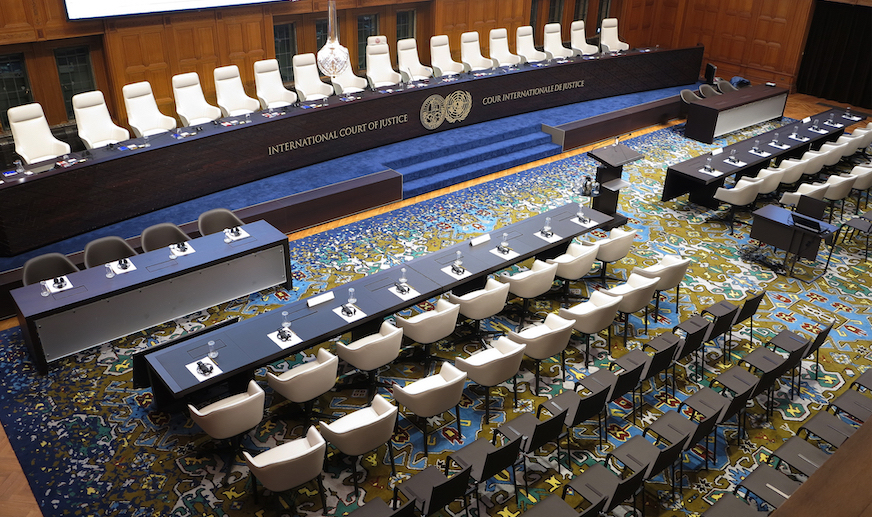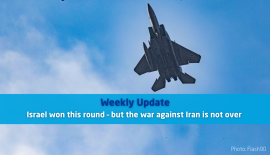South Africa sues Israel for genocide in The Hague – a classic case of “illegitimate lawfare”
Israel has been on trial in the international courts in The Hague for decades. The latest development in this saga is that South Africa has filed a case on 29th December 2023 with the International Court of Justice against Israel.
South Africa claims that Israel is committing genocide in Gaza. It requests the court to urgently order Israel to immediately cease its military campaign in Gaza.
In other words, South Africa wants to defend Hamas against Israel, by forcing Israel to stop its legitimate war of self-defence against Hamas.
The case is brought under the Genocide Convention, to which South Africa and Israel are parties.
According to Article II of the Genocide Convention, “genocide means any of the following acts committed with intent to destroy, in whole or in part, a national, ethnical, racial or religious group, as such:
- Killing members of the group;
- Causing serious bodily or mental harm to members of the group;
- Deliberately inflicting on the group conditions of life calculated to bring about its physical destruction in whole or in part;
- Imposing measures intended to prevent births within the group; (e) Forcibly transferring children of the group to another group.
Hearings are being held at the Peace Palace in The Hague on 11th and 12th January 2023.
From both legal and factual perspectives, this is a very one-sided, contentious and tenuous claim. Some analysts argue that this is an example of illegitimate “lawfare”, and that South Africa is misusing international law to deliberately attack and undermine Israel’s security and legitimate rights:
- U.S. National Security Council spokesperson John Kirby called the lawsuit “meritless, counterproductive, and completely without any basis in fact whatsoever,” while Israel has rejected it as “blood libel.”
- Barrister Natasha Hausdorff argues that this case is a modern blood libel against the only Jewish State, that will only serve to fuel antisemitism.
- Human Rights lawyer Arsen Ostrovsky argues that “If the court wishes to maintain its credibility, respect for the rule of law and sacrosanct obligation in holding real perpetrators of genocide accountable, it will immediately dismiss these baseless and mendacious proceedings against Israel and direct its attention solely to the crimes of Hamas.”
- Rosalie Silberman Abella, the Samuel and Judith Pisar Visiting Professor of Law at Harvard Law School who served as a justice of the Supreme Court of Canada from 2004 until 2021, argues that “this case represents an outrageous and cynical abuse of the principles underlying the international legal order that was set up after the Second World War.”
In this article, Professors Yuval Shany and Amichai Cohen argue that South Africa is selectively using facts to support a contentious case. They conclude that while this may have short-term success, “making problematic legal claims in order to meet jurisdictional conditions does not serve the interest of promoting international law’s effectiveness and credibility in the long run, especially when those claims would nowhere near suffice if the Court ever addresses the merits. We fear that if terms such as genocide were to be used loosely in order to achieve immediate political or tactical legal goals, overall respect to international law as a credible system of norms will diminish.”
The South African Application completely ignores the complex urban warfare in which Israel is engaged in Gaza, as well as Hamas’ deliberate use of human shields to maximize Palestinian civilian deaths. One of the main challenges of the Israel-Hamas war is that Hamas is fighting from an extensive network of tunnels built deep underground in Gaza. Prof. Daphné Richemond-Barak explains the complexity of tunnel warfare, and its international law implications. She argues that “it has become clear that Israel cannot possibly detect or map the entirety of Hamas’s tunnel network. For Israel to persuasively declare victory, in my view, it must destroy at least two-thirds of Hamas’s known underground infrastructure… Completing this job could take a few more months. In a tunnel war requiring stamina, time, and perseverance, ending the war prematurely could mean defeat. To avoid such an outcome, Israel’s ability to determine its own timetable is key.”
In this article, Prof Marc Weller considers the argument that the International Court of Justice, the principal judicial organ of the United Nations, cannot ‘order provisional measures that impair a state’s right to self-defence.’
According to Professsor Oona Hathaway, “The Court faces an important test. The emergence of erga omnes partes standing that made this case possible is an important new development in human rights law. But it is one that will increasingly place the Court in the middle of vexing legal and political disputes. That could pose dangers, not least to the Court itself. But it could also be advantageous—bringing highly charged debates over the legality of action into a legal framework where the arguments are tested before a Court that must then explain its legal reasoning to the world—rather than festering in public accusation and counter-accusation. That is, after all, the aspiration of a legitimate legal order.”





